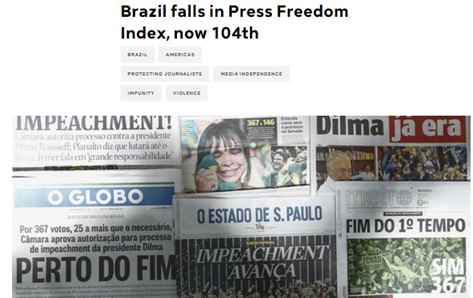Por Miguel do rosário, O Cafezinho –

Diferente do que ocorre em alguns países, porém, o rebaixamento não ocorre por repressão de governos a jornalismo crítico, e sim o contrário: pela adesão de empresas de comunicação a uma agenda política antidemocrática. A ONG denuncia, sem meias palavras, o apoio da mídia brasileira ao golpe como uma das razões para o rebaixamento da pontuação do Brasil no ranking de liberdade de expressão.
Vou traduzir apenas um trecho. Os internautas que quiserem traduzir a íntegra, divulguem aí nos comentários.
Trecho:
“(…) AO mesmo tempo, a propriedade dos meios de comunicação continua concentrada em mãos das famílias mais ricas, ligadas à classe política.
O problema dos “coroneis midiáticos”, que a RSF descreveu em 2013 em seu relatório “O país dos 30 Berlusconis” continua intocável.
Os “coroneis” são usualmente proprietários de terras, industriais, que também são deputados ou governadores, e controlam a opinião pública em suas regiões através dos meios de comunicação. Como resultado, os meios de comunicação são fortemente dependentes dos centros de poder político e econômico.
A cobertura da mídia brasileira à crise política em curso acentuou esse problema. De maneira pouco velada, os principais meios de comunicação incitaram o público a ajudar na derrubada da presidenta Dilma Rousseff.
Os jornalistas que trabalham nestes grupos estão claramente sujeitos à influência de interesses privados e partidários, e este permanente conflito de interesses prejudicam fortemente a qualidade de suas reportagens.”
***
No site da ONG Repórteres Sem Fronteiras.
April 20, 2016
Brazil falls in Press Freedom Index, now 104th
Continuing conflicts of interest in the Brazilian media and a very disturbing level of violence against journalists have caused Brazil to fall another five places in the 2016 World Press Freedom Index, published today by Reporters Without Borders (RSF).
Brazil is now ranked 104th out of 180 countries, a position clearly unworthy of a country meant to be a regional model. It was ranked 58th in 2010.
Why has this happened? The most important reason is increasing violence against journalists and a lack of political will at the highest level to protect journalists effectively. As well as the fall in the rankings, Brazil’s performance indicator, which measures the level of media freedom violations, rose from 25.78 in 2014 to 31.93 in 2015 – a significant deterioration.
The Latin American giant nonetheless remains ahead of some of its regional neighbours such as Ecuador (109th), Guatemala (121st), Colombia (134th), Venezuela (139th), Mexico (149th) and Cuba (174th).
In Brazil, an economic recession and political instability have reinforced the main obstacles to media freedom and the climate of hostility towards journalists. At the same time, media ownership continues to be concentrated in the hands of leading industrial families linked to the political class.
The problem of Brazil’s “colonels,” which RSF described in 2013 in its report, “The country of 30 Berlusconis,” has continued unabated. The so-called “colonels’ are usually major landowners or industrialists who are also legislators or state governors and who control opinion-making in their regions because, directly or indirectly, they own several local media outlets. As a result, the media are heavily dependent on the centres of economic and political power.
Brazilian media coverage of the country’s current political crisis has highlighted the problem. In a barely veiled manner, the leading national media have urged the public to help bring down President Dilma Rousseff. The journalists working for these media groups are clearly subject to the influence of private and partisan interests, and these permanent conflicts of interests are clearly very detrimental to the quality of their reporting.
Brazil’s fall in the Index is also the result of the lack of a national mechanism for protecting journalists in danger and for combatting the prevailing impunity for crimes of violence against journalists, which is facilitated by the ubiquitous corruption.
With seven journalists murdered in 2015 alone, Brazil continues to be the western hemisphere’s third deadliest country for media personnel, after Mexico and Honduras. All of them were investigating sensitive subjects such as corruption and organized crime.
Organized crime’s firm hold on certain regions far from any major city makes covering these subjects particular complicated there, while the failure to punish most murders of journalists encourages their recurrence.
Finally, there has been no let-up in the growing problem of military police violence against journalists during street demonstrations, a problem that began in 2013. Both Brazilian and foreign journalists covering demonstrations are often insulted, threatened or arbitrarily detained. They are also often directly targeted by demonstrators, who identify them with the owners of the media they work for.
Published annually by RSF since 2002, the World Press Freedom Index measures the level of freedom available to journalists in 180 countries using the following criteria – pluralism, media independence, media environment and self-censorship, legislative environment, transparency, infrastructure, and abuses.









